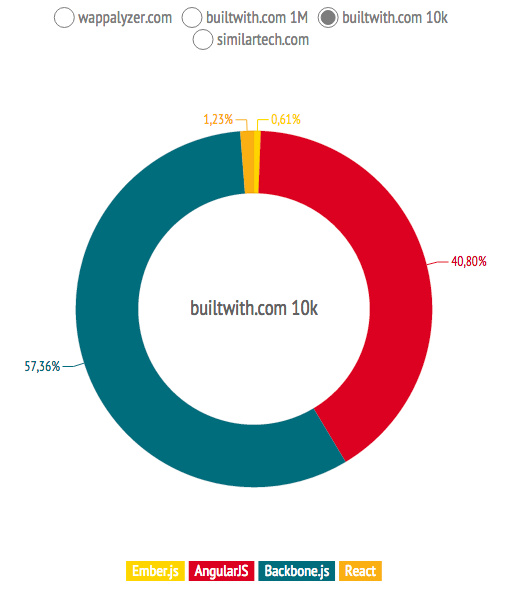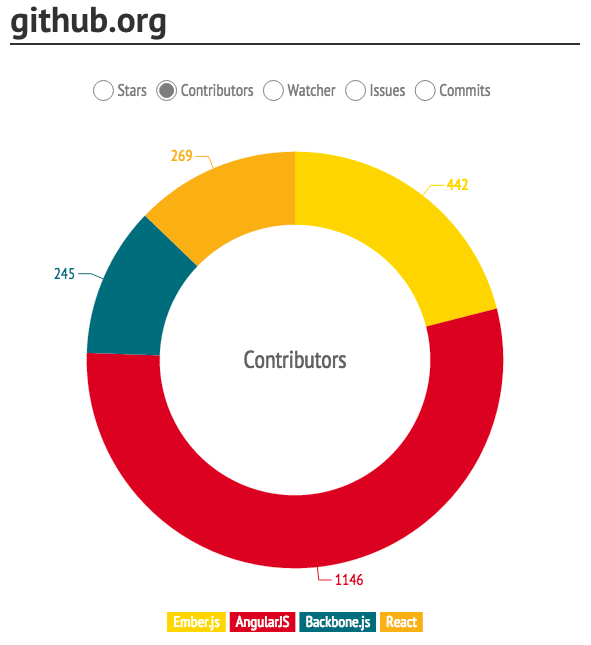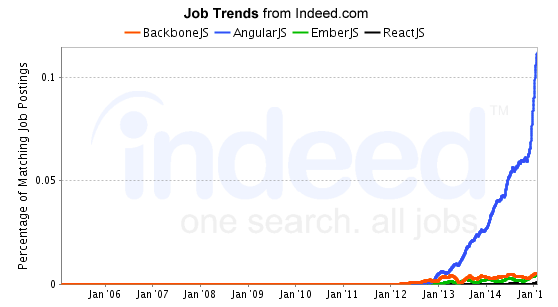Among JavaScript frameworks used to build Web apps, BackboneJS stands out. Across large or small websites, BackboneJS owns at least half the market, according to data aggregated by VisionMobile.
What BackboneJS clearly does not own, however, is the future.
That distinction goes to AngularJS, the popular framework gestated at Google. Though BackboneJS has a head start in terms of deployments, AngularJS rules the community—and community, in the long run, always wins.
Flavor-Of-The-Month Club
Ask a Web developer to name her preferred front-end JavaScript framework—a collection of JavaScript code libraries, templates and other software intended to make it easier for developers to build dynamic Web pages or Web apps—and you’re likely to get a wide range of answers. jQuery! EmberJS! AngularJS! SproutCore!
Actually, no—you won’t hear anyone say SproutCore anymore.
In its day (five years ago, an eternity on the Web), SproutCore was everyone’s darling. It was what Charles Jolley and his team used to build Apple’s iCloud apps. It enabled developers to build sophisticated Web and mobile apps. It was cool.
Until it wasn’t.
BackboneJS more or less replaced it, used by LinkedIn and others. But then along came EmberJS (born from the ashes of SproutCore), then AngularJS, then ReactJS….
You get the picture. Change is the one constant in tech, generally, but nowhere is this more true than in the fast-changing world of JavaScript. Every other year, fashions seem to change and a new framework emerges.
AngularJS, however, seems different.
Simplifying Development

For several years, BackboneJS has has accumulated design wins. Web apps as diverse as Sony Entertainment Network, WordPress, and Stripe use BackboneJS to build native-quality app experiences that run in a browser. This translates into close to 60% market share among other JavaScript frameworks, as VisionMobile shows.
The problem for BackboneJS, however, is that red portion of the chart. That’s AngularJS, and all signs point to it taking a massive chunk of the JavaScript market.
AngularJS, like MongoDB and MySQL in the database world, makes Web application development simple. It’s so easy to get started, it lowers hurdles to developers itching to build their apps.
Of course, “simple” can be deceptive. As Anand Mani Sankar describes:
The AngularJS journey can evoke mixed feelings. The learning curve is very different from other JS frameworks. The initial barrier to get started is very low. But once you start diving deep the learning curve suddenly becomes steep.
But it’s not just AngularJS’ initial simplicity that makes it appealing. As its creator, Misko Hevery, notes:
[T]he thing that really hits it home for people is that we have this idea of a directive. Rather than writing everything inside of JavaScript and then having a bunch of templates to generate the UI, you write a lot of it in HTML and HTML drives the assembly of the application. It’s kind of the reverse thing. It’s very unique. Nobody else has this particular approach.
This ability to live in HTML is powerful: It’s not super complicated yet also very expressive. It allows Web developers to do a lot with comparatively little.
The Community Has Spoken
Developers love it. Really, really love it.
One way to visualize this is through GitHub activity. AngularJS has far more contributors than any of the competing JavaScript frameworks.

Other ways of measuring popularity, like StackOverflow mentions or Google searches, also favor AngularJS.
As VisionMobile finds, AngularJS has twice as many posts as BackboneJS and EmberJS combined on Stackoverflow, and 65X more than relative newcomer ReactJS.
It’s hard to argue with those numbers.
Perhaps even more compelling, however, are the employment trends for the different frameworks. As developer jobs site Indeed reveals, AngularJS dwarfs every other framework, whether measured in terms of absolute jobs posted (as seen below) or relative job growth.

So Has AngularJS Won?
None of which means you must use AngularJS. Fans of EmberJS, for example, will appreciate its more careful approach to backward compatibility, an area in which AngularJS has not done very well.
And then there’s ReactJS, a framework developed at Facebook that has lately been leading the pack in terms of innovation. Many of the other frameworks, including AngularJS, have borrowed from ReactJS’ approach, signaling that it may be the new framework to beat.
Or, really, there may be any number of reasons to choose one framework over another, as we’ve covered here at ReadWrite before.
But if you’re hoping to find safety in numbers, your choice is clear: AngularJS. It’s the clear community winner, and is starting to match that outsized community with real-world app deployments. That may not declare it the once-and-for-all winner, but it’s a pretty compelling argument for at least giving it a try.
Photo by Phil Whitehouse

















